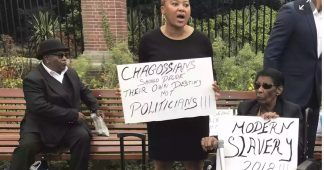Nov 19, 2019
Another shadowy figure with connections to the Mega Group, Mossad, U.S. intelligence and organized crime is the “fugitive financier” Marc Rich, whose pardon during the last days of the Clinton White House is both well-known and still mired in controversy years after the fact.
Marc Rich was a commodities trader and hedge fund manager best known for founding the commodity trading and mining giant Glencore and for doing business with numerous dictatorships, often in violation of sanctions. He worked particularly closely with Israel and, according to Haaretz:
In the years after the 1973 Yom Kippur War and the ensuing global Arab oil embargo, a period when nobody wanted to sell oil to Israel, for almost 20 years Rich was the main source of the country’s oil and energy needs.”
It was that trading on Israel’s behalf that would ultimately lead to Rich being charged in 1983 for violating the U.S. oil embargo on Iran by selling Iranian oil to Israel. Rich was also charged with tax evasion, wire fraud, racketeering and several other crimes.
Haaretz also noted that Rich’s businesses were “a source of funding for secret financial arrangements” and that “his worldwide offices, according to several reliable sources, frequently served Mossad agents, with his consent.” Rich had more direct ties to the Mossad as well. For instance, his foundation — the Rich Foundation — was run by the former Mossad agent Avner Azulay. Rich was also friendly with prominent Israel politicians, including former Prime Ministers Menachem Begin and Ehud Barak, and was a frequent provider of “services” for Israeli intelligence, services he freely volunteered.
According to Rich’s biographer, Daniel Ammann, Rich also fed information to U.S. intelligence but declined to give specifics. “He did not want to tell with whom he cooperated within the U.S. authorities or which branch of the U.S. government he supplied with intelligence,” Ammann said in an interview with the Daily Beast.
One clue as to the nature of Rich’s relationship to U.S. intelligence is his apparent ties to BCCI. “The BCCI Affair” report mentions Rich as a person to investigate in relation to the bank and states:
BCCI lending to Rich in the 1980s amounted to tens of millions of dollars. Moreover, Rich’s commodities firms were used by BCCI in connection with BCCI’s involv[ement] in U.S. guarantee programs through the Department of Agriculture. The nature and extent of Rich’s relationship with BCCI requires further investigation.”
Rich was also deeply tied to the Mega Group, as he was one of the main donors to the Birthright Israel charity along with Mega Group co-founder Charles Bronfman and Mega Group member Michael Steinhardt. Steinhardt was particularly close to Rich, first meeting the commodities trader in the 1970s and then managing $3 million for Rich, Rich’s then-wife Denise, and Rich’s father-in-law from the early 1980s to the mid-1990s through his hedge fund. In the late 1990s, Steinhardt would enlist other Mega Group members, such as Edgar Bronfman, in the effort to settle the criminal charges against Rich, which eventually came to pass with Clinton’s controversial pardon in 2001. Steinhardt claimed to have come up with the idea of a presidential pardon for Rich in late 2000.
Rich’s pardon was controversial for several reasons, and many mainstream outlets asserted that it “reeked of payoff.” As the New York Post noted in 2016, in the run-up to the presidential pardon the financier’s ex-wife Denise had donated $450,000 to the fledgling Clinton Library and “over $1 million to Democratic campaigns in the Clinton era.” In addition, Rich had hired high-powered lawyers with links to powerful individuals in both the Democratic and Republican parties as well as the Clinton White House, including Jack Quinn, who has previously served as general counsel to the Clinton administration and as former chief of staff to Vice President Al Gore.
However, per Clinton’s own words and other supporting evidence, the main reason behind the Rich pardon was the heavy lobbying from Israeli intelligence, Israeli politicians and members of the Mega Group like Steinhardt, with the donations from Denise Rich and Quinn’s access to the president likely sweetening the deal.
Among the most ardent lobbyists for Rich’s pardon were then-Israeli Prime Minister Ehud Barak, former Prime Minister Shimon Peres, then-Mayor of Jerusalem Ehud Olmert, then-former Foreign Minister Shlomo Ben-Ami and former Director of the Mossad Shabtai Shavit. According to Haaretz, Barak was so adamant that Clinton pardon Marc Rich that he was heard shouting at the president on at least one occasion. Former adviser to Barak, Eldad Yaniv, claimed that Barak had shouted that the pardon was “important … Not only from the financial aspect, but also because he helped the Mossad in more than one instance.”
The Israel lobbying effort had considerable help from Mega Group member Michael Steinhardt as well as Abe Foxman of the Anti-Defamation League (ADL), which was at the time heavily funded by Mega Group members, including Ronald Lauder and Edgar Bronfman.
There has been speculation for years that Clinton’s decision to pardon Rich may have been the result of “leverage” or blackmail that Israel had acquired on the then-president’s activities. As was noted in Part III of this report, the Mossad-linked “Mega” spy scandal broke in 1997, whereby Israeli intelligence had been targeting Clinton’s effort to broker a peace agreement between Israel and Palestine and had sought to go to “Mega,” likely a reference to the Mega Group, to obtain a sensitive document.
In addition, Israel is known to have acquired phone conversations between Clinton and Monica Lewinsky before their affair was made public. Author Daniel Halper — relying on on-the-record interviews with former officials and hundreds of pages of documents compiled in the event that Lewinsky took legal action against Clinton — determined that Benjamin Netanyahu told Clinton that he had obtained recordings of the sexually-tinged phone conversations during the Wye Plantation talks between Israel and Palestine in 1998. Netanyahu attempted to use this information to get Clinton to pardon convicted Israeli spy Jonathan Pollard. Clinton considered pardoning Pollard but decided against it after CIA Director George Tenet threatened to resign if the pardon was given.
Investigative journalist and author Gordon Thomas had made similar claims years prior and asserted that the Mossad had obtained some 30 hours of phone-sex conversations between Lewinsky and Clinton and used them as leverage. In addition, a report in Insight magazine in May 2000 claimed that Israeli intelligence had “penetrated four White House telephone lines and was able to relay real-time conversations on those lines from a remote site outside the White House directly to Israel for listening and recording.”
Those phone taps apparently went well beyond the White House, as revealed by a December 2001 investigative report by Carl Cameron for FOX News. According to Cameron’s report:
[Israeli telecommunications company Amdocs] helped Bell Atlantic install new telephone lines in the White House in 1997…[and] a senior-level employee of Amdocs had a separate T1 data phone line installed from his base outside of St. Louis that was connected directly to Israel…
[I]nvestigators are looking into whether the owner of the T1 line had a ‘real time’ capacity to intercept phone calls from both the White House and other government offices around Washington, and sustained the line for some time, sources said. Sources familiar with the investigation say FBI agents on the case sought an arrest warrant for the St. Louis employee but [Clinton] Justice Department officials quashed it.“
There has been speculation for years that Clinton’s decision to pardon Rich may have been the result of “leverage” or blackmail that Israel had acquired on the then-president’s activities. As was noted in Part III of this report, the Mossad-linked “Mega” spy scandal broke in 1997, whereby Israeli intelligence had been targeting Clinton’s effort to broker a peace agreement between Israel and Palestine and had sought to go to “Mega,” likely a reference to the Mega Group, to obtain a sensitive document.
In addition, Israel is known to have acquired phone conversations between Clinton and Monica Lewinsky before their affair was made public. Author Daniel Halper — relying on on-the-record interviews with former officials and hundreds of pages of documents compiled in the event that Lewinsky took legal action against Clinton — determined that Benjamin Netanyahu told Clinton that he had obtained recordings of the sexually-tinged phone conversations during the Wye Plantation talks between Israel and Palestine in 1998. Netanyahu attempted to use this information to get Clinton to pardon convicted Israeli spy Jonathan Pollard. Clinton considered pardoning Pollard but decided against it after CIA Director George Tenet threatened to resign if the pardon was given.
Investigative journalist and author Gordon Thomas had made similar claims years prior and asserted that the Mossad had obtained some 30 hours of phone-sex conversations between Lewinsky and Clinton and used them as leverage. In addition, a report in Insight magazine in May 2000 claimed that Israeli intelligence had “penetrated four White House telephone lines and was able to relay real-time conversations on those lines from a remote site outside the White House directly to Israel for listening and recording.”
Those phone taps apparently went well beyond the White House, as revealed by a December 2001 investigative report by Carl Cameron for FOX News. According to Cameron’s report:
[Israeli telecommunications company Amdocs] helped Bell Atlantic install new telephone lines in the White House in 1997…[and] a senior-level employee of Amdocs had a separate T1 data phone line installed from his base outside of St. Louis that was connected directly to Israel…
[I]nvestigators are looking into whether the owner of the T1 line had a ‘real time’ capacity to intercept phone calls from both the White House and other government offices around Washington, and sustained the line for some time, sources said. Sources familiar with the investigation say FBI agents on the case sought an arrest warrant for the St. Louis employee but [Clinton] Justice Department officials quashed it.“
According to journalist Chris Ketcham:
[Both Amdocs and Verint Inc. (formerly Comverse Infosys)] are based in Israel – having arisen to prominence from that country’s cornering of the information technology market – and are heavily funded by the Israeli government, with connections to the Israeli military and Israeli intelligence…
The companies’ operations, sources suggest, have been infiltrated by freelance spies exploiting encrypted trapdoors in Verint/Amdocs technology and gathering data on Americans for transfer to Israeli intelligence and other willing customers (particularly organized crime).”
Given the extent of phone tapping of the U.S. government by Israeli intelligence-linked companies and Netanyahu’s previous use of intercepted phone calls to pressure Clinton to pardon Jonathan Pollard, it is entirely reasonable to speculate that some other trove of intercepted communications could have been used to push Clinton to pardon Rich in the final hours of his presidency.
Also notable is the fact that several figures who heavily lobbied Clinton over the Rich pardon had ties to Epstein, who also had ties to Israeli intelligence and Israeli intelligence-linked tech companies, as discussed in Part III of this series. For example, Ehud Barak, a close friend and business associate of Epstein, and Shimon Peres, who introduced Barak to Epstein, were the major players in convincing Clinton to pardon Marc Rich.
Furthermore, as will be shown in a subsequent section of this report, Jeffrey Epstein had developed ties with the Clinton administration beginning in 1993 and those ties expanded, particularly in 1996, when Epstein’s intelligence-linked sexual blackmail operation was underway. Clinton would later fly on Epstein’s infamous private jet, nicknamed the “Lolita Express,” and Epstein would later donate to the Clinton Foundation and claim to have played a key role in the creation of the Clinton Global Initiative.
In addition to the role of figures close to Epstein in securing Rich’s pardon, Epstein himself appeared to share some level of connection with Rich’s former business partners. For instance, Felix Posen — who ran Rich’s London operations for years and whom Forbes described as “the architect of Rich’s immensely profitable but suddenly very controversial business with the Soviet Union” — appears in Epstein’s book of contacts. In addition, Epstein’s offshore structured investment vehicle (SIV), Liquid Funding, has the same attorney and director as several Glencore entities: Alex Erskine of the law firm Appleby.
The significance of that connection, however, is unclear, given that Erskine was connected to a total of 274 offshore entities at the time of the “Paradise Papers” leak in 2014. Catherine Austin Fitts told MintPress that it could suggest that Epstein’s Liquid Funding — 40 percent of which had been owned by Bear Stearns, and which may have received a “secret” bail-out from the Federal Reserve — is part of the same shadow economy “syndicate” as Glencore.
This possibility merits further investigation, given that Glencore is partially ownedby British financier Nathaniel Rothschild, whose father, Jacob Rothschild, is on the board of advisers of Genie Energy, which includes Michael Steinhardt as well as several alleged associates of Epstein, such as Bill Richardson and Larry Summers. In addition, Nathaniel Rothschild’s cousin by marriage, Lynn Forester de Rothschild, is a long-time associate of Jeffrey Epstein with considerable ties to the New York City “Roy Cohn machine.” Marc Rich had long-standing ties to the Rothschild family, going back to the early 1970s when he began commodity trading at Philipp Brothers.
Published at https://russia-insider.com/en/politics/epsteins-network-part-4-marc-richs-pardon-and-israels-leverage-over-clinton











